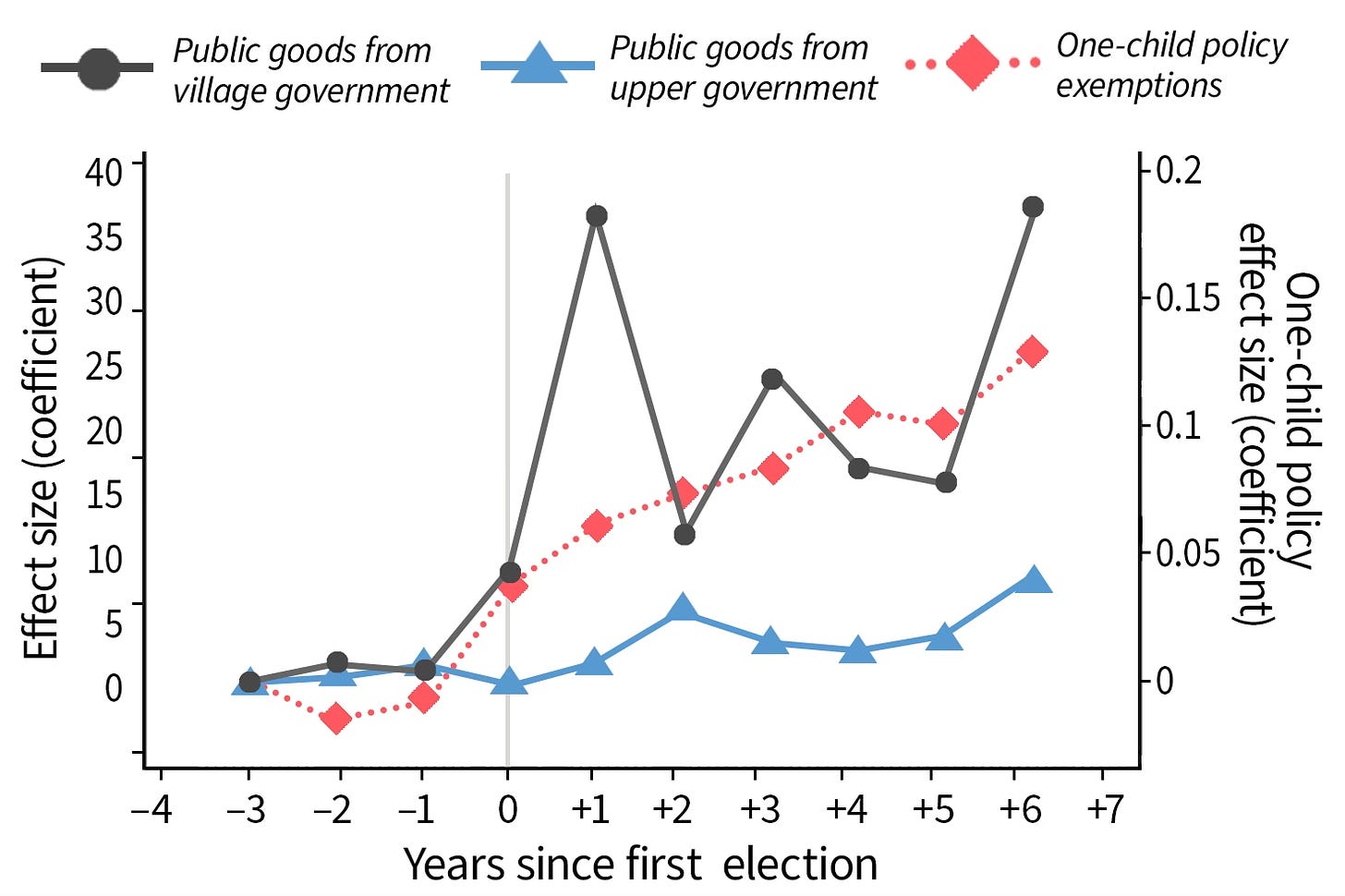Why Did China Experiment with and then Abandon Village Elections?
Why did China’s government allow for village elections only to later deprive elected officials of meaningful authority?
INSIGHTS
Analysis of decades of village governance data from China reveal that nationwide village elections launched in 1987 shifted important authority to locally elected officials away from Party-appointed officials.
Elected officials increased spending on popular public goods, like roads and irrigation, and curbed unpopular practices, like land expropriation and one-child policy enforcement, in effect weakening vertical authority.
As China’s wealth increased, the state expanded its bureaucratic capacity and gradually imposed new restrictions on the authority and autonomy of elected village leaders.
The analysis suggests China’s government prefers direct control when feasible but saw delegation through village elections as beneficial when bureaucratic capacity was weak.
Source Publication: Monica Martinez-Bravo, Gerard Padró i Miquel, Nancy Qian, and Yang Yao (2022). The Rise and Fall of Local Elections in China. American Economic Review.
China’s central government has often struggled to implement policies across its vast and diverse rural areas. In the 1980s and 90s, provision of public goods like irrigation, schools, and roads was weak at the village level. At the same time, local leaders were known to enrich themselves by leasing collective land to enterprises and enforcing unpopular policies like the one-child policy. Village elections were gradually introduced in 1987 to address ineffective and contentious village governance, and the elections continue today, albeit in a diminished form. What was the effect of the elections and why did Beijing eventually deprive elected officials of any meaningful authority?
The data. The authors combined two datasets to conduct their study: the National Fixed Point Survey (NFS) and the Village Democracy Survey (VDS). The NFS provided data on village public goods expenditures and land allocation decisions since 1986. The authors supplemented the NFS by conducting the VDS in three waves (2006, 2011, and 2019) to capture detailed governance data for a highly representative sample of 217 villages, including electoral reform history, public spending, one-child policy exemptions, village leader characteristics, and changes in the autonomy of village chairmen. The analysis offers a decades-long view of village governance from the period of electoral reforms through 2019.
Elections shift real authority to elected village chairmen. Governance at the village level — China’s lowest level of government — is shared between two bodies: the village committee, led by the village chairman, and the village branch of the Communist Party of China, led by the party secretary. Compared to villages with no elections, villages with elections saw a rise in the number of policies for which the village chairman was the sole signatory (22% higher than the sample mean); no change in the number of policies signed by both the village chairman and the party secretary; and a decline in the policies signed by only the party secretary. Taken together, these findings suggest that the village chairmen gained meaningful authority over village affairs owing to the elections.
The effect of elections on village policy outcomes
Elections boost popular policies, curb unpopular policies. Compared to villages with no elections, public goods expenditures in election villages rose from virtually zero to 166,040 RMB per villager in the year following elections, while the amount of expropriated land leased to enterprises fell by 61 mu from the sample average of 111 mu. The elections also weakened the implementation of unpopular policies mandated by the central government. For example, the number of exemptions given out for the one-child policy increased in election villages, with one additional exemption granted in every 10 observations. Elections also reduced the likelihood of land being taken for upper-level government projects (e.g., highways and airports) by 1.3 percentage points. Elected village chairmen that implemented popular policies had a higher chance of reelection. These findings suggest that accountability to voters may have aligned policy implementation with local preferences, but also weakened the vertical control of higher levels of government.
Increased bureaucratic capacity erodes power of elected officials. Between 1980 and 2015, China’s rapid growth increased government revenues over twenty-fold. Using county government revenue as a share of GDP as a proxy for government capacity, researchers found that from 2002 to 2017, a one standard deviation rise in county revenue led to a 0.42 standard deviation decrease in unilateral policy signing by village chairmen and an increase in joint policy signing with village party secretaries. This effect was smaller in more remote villages.
Three managerial practices meant to assert control over elected leaders were also more common in faster-growing counties: the first required villages to secure upper government permission to access funds, and the second and third involved county authorities placing university students or county cadres into village governments to enhance oversight. All three programs were more frequently applied as county resources grew, but the increase was smaller for remote villages, suggesting that the upper government preferred direct control when feasible, but saw delegation as beneficial in distant villages.
Meaningful elections a stopgap measure, not an end in itself. Researchers conclude that China introduced local elections to delegate the monitoring of officials to citizens, leveraging their local knowledge to improve accountability and reduce corruption. However, elected officials had little motivation to enforce unpopular central policies, weakening vertical authority. As resources grew, the government invested in a stronger top-down system, progressively limiting village leaders’ autonomy. This may explain why China introduced elections in the 1980s when it was poor and began undermining them in the 2000s after becoming wealthier.




